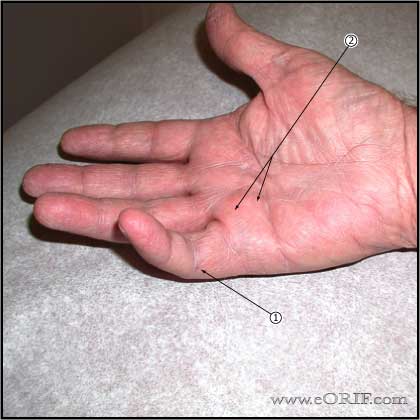 |
synonyms:Dupuytren's Contracture
Dupuytren's Contracture ICD-10
Dupuytren's Contracture ICD-9
Dupuytren's Contracture Etiology / Epidemiology / Natural History
- Autosomal dominant fibroproliferative disease with variable penetrance
- Most common in Caucasians of Celtic descent
- Men > women
- Generally occurs in patients >50yrs old
- autosomal dominant transmission with variable penetrance.
- Has been linked human leukocyte antigen (HLA)-DR3. (Neumuller J, Clin Immunol Immunopathol. 1994;71:142)
- Associated with: diabetes, smoking, chronic alcoholism, epilepsy, infection
Dupuytren's Contracture Anatomy
- Retrovascular cords may displace digital nerves superficially and toward the center of the digits generally at the level of the metacarpophalageal joints. (Rayan GM, Hand Clin 1999;15:73). Fascia deep to the neurovascular bundle forms the retrovascular cord.
- Pretendinous cords are formed from pretendinous bands in the palms.
- Natatory cords are formed from the natatory ligaments in the palm.
- Central cords are formed from the volar superficial fascia in the digits.
- Lateral cords are formed from the lateral digital sheets in the digitis.
- Spiral cord arises from the lateral digital sheet, the pretendinous ligament, the spiral band, and the Grayson ligament.
Dupuytren's Contracture Clinical Evaluation
- palmar nodule and cord adherent to the skin
- flexion contracture
- may have pitting over the nodule
Dupuytren's Contracture Xray / Diagnositc Tests
- Imaging studies are normal.
Dupuytren's Contracture Classification / Treatment
- Consider Xiaflex. CPT 20527: injection, enzyme, palmar fascial cord. CPT 26341: manipulation, palmar fascial cord, postenzyme injection.
- Treatment options: needle aponeurotomy (26040), collagenase injection (20527, Xiaflex), total or limited fasciectomy (26123). Full thickness Skin grafts are beneficial for severe, diffuse disease and recurrences.
- Collagenase injections: best for low severity, MP joint contractures . Patients should have well defined, palpable cord. Contra-indicated in patients on anticoagulation. Has been shown to improve ROM from 43.9º to 80.7º, versus, 45.3º to 49.5º for placebo. (Hurst LC, N Engl J Med.2009;361:968)
Dupuytren's Contracture Associated Injury / Differential Diagnosis
- trigger finger
- stenosing tenosynovitis
- ganglion cyst
- soft-tissue mass
Dupuytren's Contracture Complications
- tendon rupture
- digital nerve injury
- recurrence
- lymphatic reaction (collagenase injections)
- flexion contracture
- hematoma
- skin sloughing
- infection
- edema
- CRPS
Dupuytren's Contracture Follow-up Care
- Post op splint in extension and begin range-of-motion exercises within one week with occupational therapy.
- Continue splinting for 6 weeks, followed by night splintgin for 3 months.
Dupuytren's Contracture Review References
- Hall PN, Fitzgerald A, Sterne GD, Logan AM. Skin replacement in Dupuytren's disease. J Hand Surg Br. 1997 Apr;22(2):193-7.
- Heuston JT. The control of recurrent Dupuytren's contracture by skin replacement. Br J Plast Surg. 1969 Apr;22(2):152-6.
- MCCASH CR. THE OPEN PALM TECHNIQUE IN DUPUYTREN'S CONTRACTURE. Br J Plast Surg. 1964 Jul;17:271-80.
- Roush TF, Stern PJ. Results following surgery for recurrent Dupuytren's disease. J Hand Surg Am. 2000 Mar;25(2):291-6.
- °
|

